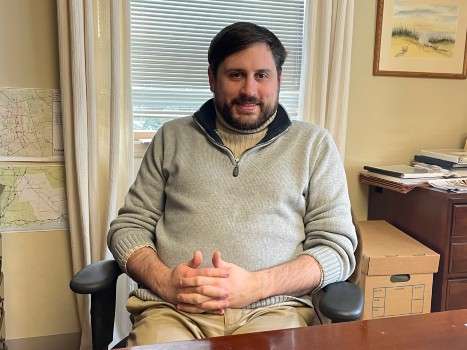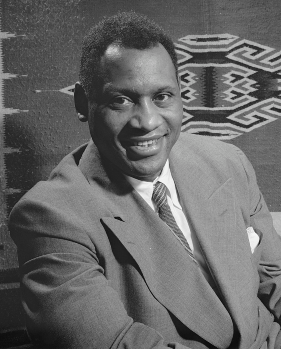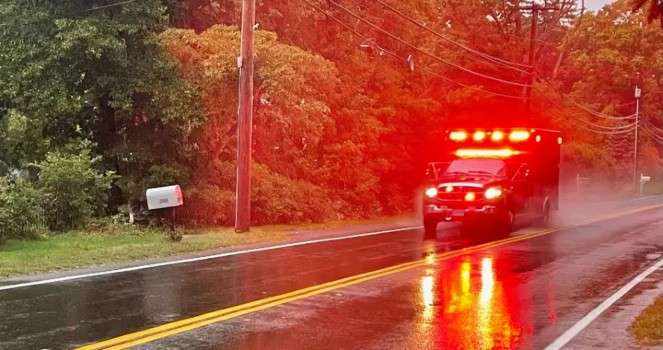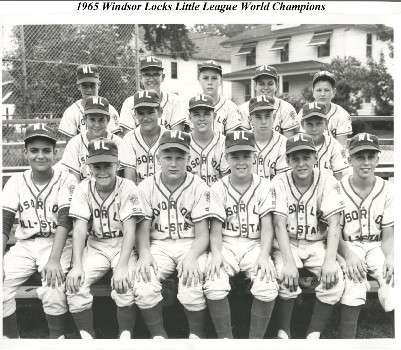By Clark Judge
(January 24, 2024) — As Killingworth’s First Selectman, Eric Couture is something of an anomaly. He’s the first male to hold that office in 15 years. At 34 he’s the youngest First Selectman since Rick Albrecht took the oath at 28 in 1977. And he’s lived in Killingworth his entire life, taking a break only when he left for the Rochester Institute of Technology to major in political science.
Then there’s this: Though he once considered running for office, he never gave it serious consideration until last summer … or four months before the November election.
That was when Annie Stirna, who chairs the Killingworth Town Democratic Committee, spoke with him while the two were at a July celebration in New London. He thought she might ask him to run for the Board of Education, where he sat from 2015-19, and she did. But then she sought his interest in running as the Democratic choice for First Selectman.
“It was a little bit of a ‘blind-side,’ ” Couture said. “I told her to let me think about it.”
She did, and within a week she had her answer. After speaking with former First Selectwoman Cathy Iino and Selectman Lou Annino, Couture was all in. The rest you know. He not only scored a decisive victory in November; he pulled down almost twice as many votes (1,117) as Republican candidate Amy Roberts-Perry (612) and more than Roberts-Perry and Killingworth Conservative Party candidate John Samperi (418) combined.
“There are big challenges in the future for Killingworth,” Couture said this month, “but I think they take somebody who can take a long view, has grown up here, knows the history of the town, knows the character and aesthetic of the town and wants to preserve as much of that as possible.”
Couture qualifies. Now comes the hard part.
Q: When you were first elected, you said you “wanted to prove myself worthy of election.” How do you plan on doing that?
COUTURE: “The big part of that is you must listen to everybody who comes in. When it comes to things like snow plowing or paving roads, there aren’t really partisan divides in how you approach them. But when it comes to how do we (accomplish other tasks), it really does come down to listening to people and making sure they’re heard and respected. Killingworth runs largely through volunteers and the number of committees that we have. We need more people all the time, and the best way to get them involved is to make sure they will be listened to … and respected … and will recognize that, while it’s not always congenial, at least we have an environment that’s open to well-intentioned discussion and a mutual respect. We may not come at something from the same viewpoint, but that doesn’t make us enemies. It just means we have different life experiences, and we value some things more than others. And that’s not wrong or right. It’s just how it is.”
Q: Prior to the election some people said it was time that youth was served. At 34, you’re the youngest First Selectman in 46 years. Did you feel that it was time Killingworth recognized another generation?
COUTURE: “I don’t know if it’s a different viewpoint, but there is value in experience. Having lived in town, I have some of that experience. But you also need to have a longer-term look at things, and in my view, I think that’s part of what someone who is younger can bring. Because you’re not as tethered to what has happened so much as you are to what can happen. I think that’s one of the big challenges we have nowadays. We’re so focused on the moment that we forget to stop and focus on what has happened and what lies ahead. It’s important for younger people to be involved and think about that because, to be perfectly honest, we’re the ones who are going to face most of what’s ahead of us. But at the same time we want people who have experience. So, for example, Lou Annino has been on boards since before I was born, and it’s important to tap into that experience to make sure we’re not trying to re-invent the wheel. Sometimes things have been brought up in the past that didn’t work. So it’s important to know that. At the same time, we need to think about maybe wanting two or three wheels, so to speak, to make sure that what we’re doing makes sense for now and the future.”
Q: You’ve been away from public office for years. What made you want to do this and what strengths do you bring to this job?
COUTURE: “I listen to people. I try to think through all the problems that might come facing the challenge by getting as much information as I can to approach a problem. I’ll use affordable housing as an example It’s not going to be a ‘one size-fits-all’ solution that doesn’t fit Killingworth. But there are ways of working within our zoning and development, working with groups like the River COG, the state or federal government, to get grant money for localized development that can help affordable housing. It’s that kind of wide net that will help us figure out what’s being done elsewhere, what we can do here and what fits here … and that’s my approach to solving a problem. As far as why I wanted to run, I think it’s important to give back to the community. I grew up here. I played baseball on Rocco Field. I umpired at Rocco. That’s important to me. In my opinion, being a good citizen involves giving back.”
Q: Your inexperience was criticized during the campaign. Did that bother you? And, considering that lack of experience, how do you get up to speed?
COUTURE: “I’ve always been a quick learner. There’s a word that I love. It’s called ‘grok,’ and it involved coming to an intuitive understanding of issues. I’ve generally been good at ‘groking’ things as they come to bear. As for the inexperience criticism, it’s fair. I am younger. I don’t have as much experience as other people. I would argue that, from a governing perspective, business experience doesn’t necessarily equate to governing experience. Sitting in the office for a month now I’ve learned that it’s not so much what I want to do as it is: How do we bring different viewpoints together to build a consensus to move an issue forward? I think I’ve developed a relatively good working relationship with Joel (D’Angelo) and Eric (Nunes, both members of the Board of Selectmen) already. We’re hammering that along as we approach budget season, so we’re going to be meeting with one another quite a bit. So it’s not taking the attitude of, ‘OK, here’s how we’re going to approach things’, but it’s more: ‘Let’s talk through how we’re going to approach them’ that’s important.”
Q: There’s been a lot of turnover in this building. Whom have you relied on for help?
COUTURE: “It’s mostly been the people in the office. If I have an FOI (Freedom of Information) question, I go to Dawn (Reese Mooney, the town clerk). If I have a finance question, I’ll go to Gina (Regolo, the town finance director). If it’s something about building, I’ll go to Robin (Zagorodny, Land Use Administrative Assistant) and Leo (Bombalicki, the Zoning Enforcement Officer) and get their input. That sort of continuity in the office hasn’t changed that drastically, and that’s been helpful. Their perspective has been different from mine because I’m only here effectively for two years. Then I have to run again. And then everything gets thrown out of whack.”
Q: What are your most immediate priorities?
COUTURE: “The first priority is finishing the work that Nancy (Gorski) and Cathy (Iino) started on PFAs. We’re finalizing the design for filtration systems for KES, Town Hall and the town campus and getting that squared away to afford future monitoring and remediation efforts. The other big issue is affordable housing, which is part of a broader regional, national and state issue that we face. Town Hall had an affordable housing plan put together two years ago as part of their ongoing worth with the plan for conservation and development. RiverCOG (the lower Connecticut River Valley Council of Governments), which is a sort of county without being a county and a government without being a government, has an affordable housing plan. One of the biggest risk areas for any sort of growth and development within the region is the lack of affordable housing. We talked earlier about getting younger people involved. It’s hard to get younger people involved if they can’t move to town; it’s hard for older people to be involved if they can’t stay in town. So it’s an issue that hits us from both ends. Getting a grip on it is going to be a challenge, and it’s something I’ve been putting a lot of thought into in the last month. You hear about ‘affordable housing,’ and people get an image in their head. But I want to remind them that the town has changed drastically. You go back 100 years, and the town population was around 900. You go back 50 years, and it was only around 1,000. But then we exploded in the mid ‘90s and early 2000s, and part of that is what’s changed in the area. You have better availability of working in, say, New Haven, Hartford or Farmington. The day before the November election, the federal government announced infrastructure investments in rail along the shoreline. If you bring the commute to New York City down to an hour from here, then you’re going to see major changes and people wanting to move to this area. Keeping an eye on that is part of the job. People move out here because they like the woods and the peace and quiet, and that’s something that’s worth maintaining. But you have to think about you how you pay for maintaining that and how you can get people to be involved in governing or in organizations like the Lions Club where they give up their time to maintain that. The two biggest responses to the affordable housing plan and conservation development plan have been: 1) We want to keep the rural character, the rural aesthetic, of the town, but 2) we want lower taxes through more targeted development. It’s like you have two not necessarily opposed ideas, but ones that bounce off one another. Fixing that is a challenge and will be one for the next 10 years. But if you plan it properly, you can get the sort of small-town development that supports open land use that brings people to the town who want to relax and keep it the way it has been.”
Q: You and Joel D’Angelo were together on the Board of Education. But in moving to the Board of Selectmen, the two of you essentially moved from the legislative to the executive branch …and one that will soon have to deal with taxes. With such little experience, how do you navigate that –especially with the town budget coming up?
COUTURE: “To a certain extent, a lot of what the Board of Education does is budget. It’s the biggest chunk of the town’s budget, and it’s an area we devoted a lot of time talking about, with things such as how you manage it … how you keep increases down … and how you continue to bring in talent to teach. In a certain way, it is different because the Board of Education doesn’t tax. It says, ‘Ok, here’s your bill, Killingworth; you pay X amount based on your student population. You figure it out.’ So there is that tension between the town and the Board of Education, and it is interesting being on this side of things.”
Q: In what respect?
COUTURE: “I’m still feeling out that tension. Education alongside the rural aesthetic are the two big reasons people move to town. That’s why my parents moved to town. They wanted a good education for their kids. But it’s our biggest expense. If the town is thinking about where it wants to go in the 21st century, it’s going to need to make targeted development plans and targeted expenditures … whether it’s building a ball field at Auer Park, for example, which is one of the capital projects going on right now. If the school district absorbs the majority of the tax money in town, that leaves a smaller slice if we don’t want to raise taxes. It gets back to the affordable housing part of things. Part of affordable housing are the taxes people pay on their homes. So the people in Beechwood, for example, get hammered in their taxes. Striking that balance is a step removed on the Board of Education and a lot closer if you’re on the Board of Selectmen or Board of Finance. You get a broader view of what you have to deal with. When you’re on the Board of Ed, you’re focus in one part is on your responsibility as a taxpayer to keep taxes low, but you’re also charged with making sure that kids get a good education. So that balance is a little trickier.”
Q: The current mill rate is 23.47. How confident are you that you can hold it at that figure or keep it from rising appreciably?
COUTURE: “From a town campus perspective, including the fire house on town campus, we don’t have a lot of space. I think everybody has a different opinion as to what ‘appreciable’ means. For some things, like the school district and for the fire house, bonding is going to be the proper action to take. For the school district, at the moment we have bonding passing off the books from the middle school. So, some of the bonding for whatever is decided by the school district moving forward with their capital plan will fill that gap. But it will have some increase, and it will have some degree of impact on taxpayers. For the fire house, that’s a longer term plan. For the town campus, I think there are opportunities depending on what the school district decides to do — and one of them is if they decide to relieve themselves of KES (Killingworth Elementary School) as we did with HES (Haddam Elementary School). Then I think moving town functions into KES would relieve some of the pressure we have for space concerns. But that also adds other budgetary challenges. I can’t promise that taxes are going to stay at 23.47 mill, but it’s definitely something that, if we’re not growing our grand list … if we’re not doing targeted development that brings in revenue … then we’ll have to look at where we’re operating efficiently and where we’re not. With some things, grant money can cover costs.”
Q: Wait. You’re thinking of closing down KES?
COUTURE: “No. The school district is looking at different options for the school campuses. And some of the options include maintaining the number of campuses – and currently there are four. KES, Burr, the high school and the intermediate/middle school. Some of the other options involve cutting down to the middle/intermediate school campus and the high-school campus. There are a bunch of different variations that are in their court. But, based on recent conversations among the Board of Education, the Boards of Selectmen and Boards of Finance, they seem to be moving away from that idea. Nevertheless, the point that you have to be flexible and keep your eyes open to possibilities remains. ”
Q: When Nancy Gorski left, she said her advice to her successor was to be “patient.” Are you?
COUTURE: “I try to be patient. I’ve been told I can be a little contrarian, but that’s not necessarily bad if you’re arguing idea with people. It helps you form a better idea in my opinion. But, yes, I try to be patient.”
Q: You seem comfortable here. What do you like most about this job?
COUTURE: “It exposes you to a lot of information, and I’ve always enjoyed learning and reading and seeing what’s thrown at you. Every day in some way is different from the others, and that keeps it interesting.”
Q: Can you see yourself running again in two years?
COUTURE: Yes.
Q: What makes you so sure?
COUTURE: “I think what makes me most certain is that I have a longer term view of what I want to see Killingworth do. So I want to be here to see it done. I love this community. I’ve grown up here, and I think it’s important that somebody stick with it to make sure we have Killingworth for another 350 years.”
Photo by Clark Judge









